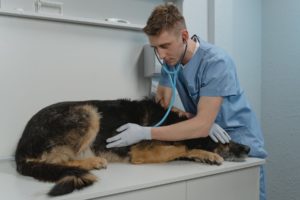
Today’s health highlight is kennel cough.
Today’s health highlight is kennel cough. It’s summer, and people have been traveling and eager to get out of the home. Pet owners, in particular, have been traveling and either taking their canine companions with them or boarding them at a kennel facility. With travel picking back up again, we’ve seen many cases of upper respiratory infections in dogs, particularly kennel cough. Kennel cough is an infectious form of bronchitis that affects dogs, especially those in crowded settings such as kennels or dog parks. Here is some vital information about kennel cough, its symptoms, treatment, and prevention.
Symptoms of Kennel Cough
You want to listen out for a hacking or whooping cough that sounds almost as if your dog has something caught in the throat. It may sound similar to a reverse sneeze. Simply put, pay close attention if you hear any respiratory distress. Other symptoms that should be on your radar include:
- A Runny Nose
- Sneezing
- Unusual Inactivity
- Appetite Loss
- Low Fever
Treatment
It all depends on which infectious agents are present and the strength of your canine companion’s immune system. This form of bronchitis can be so mild that treatment isn’t necessary or can progress into life-threatening pneumonia. Most often, if your dog is showing mild symptoms, an antibiotic and a cough suppressant will be prescribed. If your dog develops pneumonia, hospitalization may be required.
How to Prevent Kennel Cough
Just like the common cold for people, kennel cough is highly contagious. You can reduce the chances of your canine companion getting this form of bronchitis by limiting their exposure to crowded conditions. If your dog becomes ill, you also want to isolate your dog for a while, about two weeks after symptoms subside. You can clean the area your dog is staying with a standard disinfectant.
If you’re planning a stay in a doggie hotel for your canine companion or your pup enjoys making friends at the dog park, the best way to aid in kennel cough prevention is to keep your dog up-to-date on their vaccinations. Bordetella bronchiseptica is one of the most common causes of kennel cough in dogs. At Mount Carmel Animal Hospital, we administer an intranasal vaccine for pups at least six weeks old. That initial vaccine is then boostered with an injectable vaccine about one month after the first vaccination. For puppies (or adult dogs who have never been vaccinated before), two doses are necessary to ensure systemic immunity. Immunity then lasts about a year and your pup will need a booster with each annual check-up.
Canine upper respiratory infections can be caused by multiple viruses, as well. It is also vital to make sure your dog has vaccinated the other potential agents. The “distemper” vaccine is a combination vaccine that protects again the other common viral causes of upper respiratory infections. This vaccine is started in puppies at least six weeks old and is boostered every 3-4 weeks until they are at least 16 weeks old. Then, your dog will receive one vaccine at the next annual visit and every three years thereafter.
We’d also like you to note that this form of bronchitis can spread to another dog through contact with objects that an infected canine has around them, such as food/water dishes, crates, bedding, and clothing. It is best to sanitize bedding, bowls, and crates, as well as to wash your hands after touching one dog or another mainly when coming home from a dog show, park, kennel, or anywhere else you and your pup were exposed to other dogs.
Here at Mount Carmel Animal Hospital, We’ll Treat Your Pets Like Family!
Mount Carmel Animal Hospital has been serving the Northern Baltimore/Southern York community for over 30 years and is proud to be an independently operated, small animal practice committed to excellence in veterinary medicine and client service. From grooming to wellness services, along with Canine Life Skills Training Courses, and surgical procedures, we have the expertise that will best serve the needs of you and your pet. Contact us at 410-343-0200 and follow us on Facebook!
